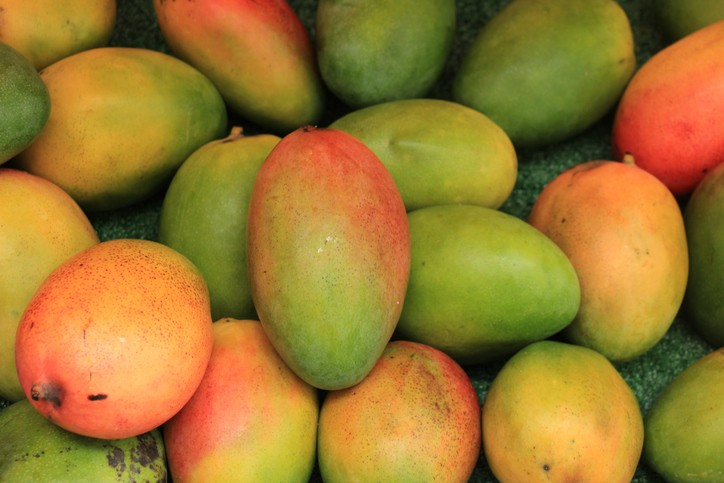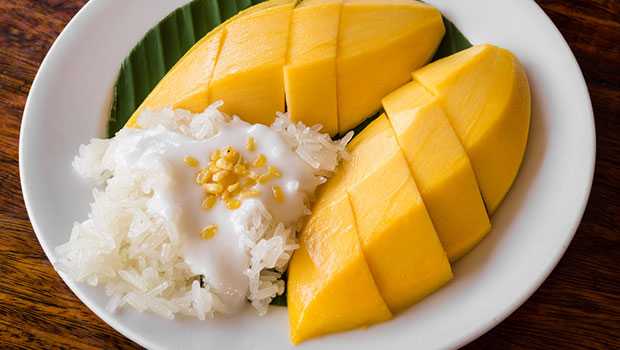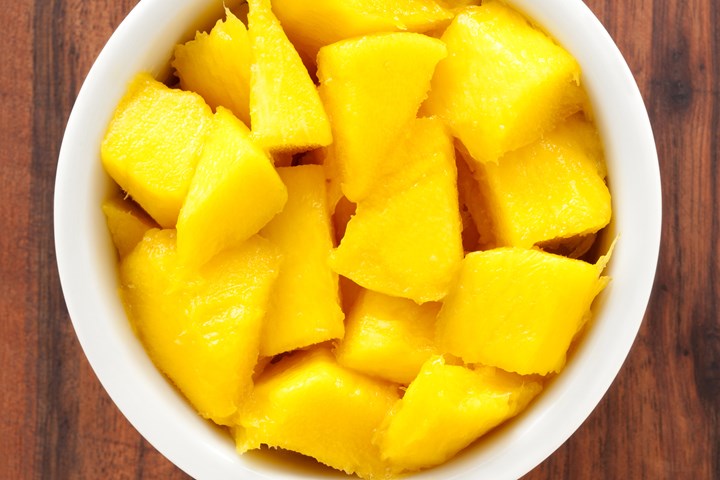Often dubbed “The King of Tropical Fruit”, mangoes always bring a sweet and delightful tropical experience to your taste bud. But did you know that mangoes are full of vitamins, minerals, and antioxidants that can benefit your health? It’s no wonder that they are given the hefty tag of ” King of Tropical Fruits”.
In addition, every part of mango – bark, leaves, and even skin – has been used for medicinal purposes in one form or another. Studies have shown that this practice even dated back to 4000 years ago!
Now let’s read on more about the background and tastes of this tropical delight, Mango!
Table of Content
- What Are Mangoes
- How to Choose the Best Mango At Your Local Market
- How Do Mangoes Taste Like in Recipe
- What Is the Texture of Mango
- Favourite Mango Recipes
- Top 10 Health Benefits of Mangoes
- How to Handle Mangoes
- How to Store Mangoes
- Risks and Side Effects of Having Too Much Mangoes
- Conclusion
What Are Mangoes
Mangoes are oval-shaped, creamy, and sweet tropical stone fruit, meaning it has an outer fleshy part surrounding a shell with a seed inside. Examples of stone fruits include coconuts, cherries, peaches, and dates.
Native to India, mangoes have been used widely in Indian cuisines. Due to its popularity and versatility as a sweet and savory ingredient for many dishes, it became a highly cultivated fruit throughout the world like Asia, Europe, Africa, etc.
Mangoes are usually yellow in color if riped, but they can be green(unripened), orange or red too. They are usually peeled and cut away from the pit before consumption.
How to Choose the Best Mango At Your Local Market
Being a very versatile fruit, mangoes can be used in all ways regardless of their degree of ripeness. Green mangoes are used as core ingredients for making mango salsas in Thailand. Yellow/Red mangoes are used for making Mango Sticky Rice in Thailand, mainly due to their creaminess and sweetness. Therefore, it’s important for anyone to distinguish between the degree of ripeness and correctly identify which mangoes to be used for making chutney or simply be eaten by themselves. Below are the guidelines you could follow to get yourself the best mangoes out there:
Texture – This is very straightforward. For most mangoes, ripening usually involves getting soft on the inside but not mushy. Think of it as you are feeling ripe avocados! Hence, squeeze the mangoes gently to see if it gives way!

Color – This is the most obvious – it’d be the first thing you’d notice before picking your mangoes! Generally, mangoes go from green to some shade of yellow/orange with a slight red hue. However, do not mistake red mangoes as a sign of overripe mangoes! The reason why they are red is because of the long exposure to the sun while the fruit is on the tree!
Smell & Fragrance – This is the most important clue to tell when a mango is ready to be eaten! Ripe mangoes usually will have a fruity aroma at their stems! Regardless of texture or color, if the mangoes are filling the air with a strong fragrance, it’s ready to be eaten!
How Do Mangoes Taste Like in Recipe?
When ripe, mangoes are some of the sweeter fruits in the fresh produce section. These ripe mangoes tend to have a sweetness and tartness profile that is similar to that of peaches. However, when unripe, they could be a little too citrusy and sour especially when it is still bright green in color. Be wary as you could draw similarities in the taste between mangoes and limes if that’s the case.
What Is the Texture of Mango?
When mangoes are unripe, the texture inside would be hard and fibrous. On the other hand, when ripe, mangoes are very soft inside.
Ripe mangoes are silky and creamy while retaining a bit of stringy texture, especially near the pit(seed) of the fruit. Ripe mangoes are also semi-firm but also soft given a light squeeze. It shouldn’t be too soft either that your fingers could sink in as that would mean it’s overripe.
Favourite Mango Recipes
Mango can be eaten raw unripe or ripe or cooked into desserts, curries, and chutneys. Generally speaking, mangoes can be used in a variety of dishes/recipes due to their versatility as a sweet and savory addition.

- Thai Mango Sticky Rice
- Mango Smoothie
- Mango Kombucha
- Mango Chutney
- Mango Salsa
Top 10 Health Benefits of Mangoes
- Lowers Blood Sugar
- Regulates Blood Pressure
- Boosts Brain Health
- Increases Immune Function
- Combats Cancer Cell Growth
- May Protect Against Macular Degeneration
- Improves Digestive Health
- Supports Strong Bones
- Slows Down Aging
- May Protect Against Asthma
Mangoes are packed with rich vitamins and minerals such as niacin, magnesium, and folate as well as powerful antioxidants including zeaxanthin, quercetin, and beta carotene.
1. Lowers Blood Sugar

Rich in fiber and antioxidants, adding mango to your diet can affect the level of your blood sugar in the bloodstream. Studies have found that supplementing mangoes to obese people could have a positive change in their blood sugar levels.
The fiber in mangoes may help promote stable and normal blood sugar levels. Fiber goes through your gastrointestinal tract without getting digested, slowing down the absorption of sugar in the process.
2. Regulates Blood Pressure

Pretty sure everyone knows how risky high blood pressure is. Most people who have it are unaware that they have it and hence the nickname “The Silent Killer”. High Blood Pressure places an extra strain on the heart muscle, forcing it to work harder to pump blood throughout the body to work efficiently.
Fortunately, mangoes are high in magnesium and potassium – two essential nutrients that are vital when it comes to regulating blood pressure. In addition, mangoes are low in sodium which should be limited in diets for those with high blood pressure.
3. Boosts Brain Health

Mango is packed with essential vitamins, most notably Vitamin B6, which is essential for maintaining brain function. Deficient in this key nutrient could lead to impaired cognitive function and neurological decline. Vitamin B6 and other B vitamins are crucial for maintaining the function of brain neurotransmitters and supporting a good healthy mood as well as promoting regular sleeping patterns.
4. Increases Immune Function

The immune system is vital in your body system as it acts as the first line of defense against unwanted foreign invaders or pathogens like viruses and bacteria, keeping you healthy and feeling the best.
In this respect, a dose of vitamin C can help support your immune system to ward off illnesses and infections. Mangoes contain Vitamin C which is required to reduce the severity of respiratory infections like the common cold, pneumonia, and many others.
5. Combats Cancer Cell Growth

Mangoes are high in pectin, a naturally occurring starch that helps lower not only cholesterol levels but also protects you against prostate cancer. Additionally, mangoes are high in vitamin C and beta-carotene, which are antioxidants that help reduce prostate cancer in men.
6. May Protect Against Macular Degeneration
Age-related macular degeneration is a common condition faced by people over the age of 60, where part of the eye macular, that provides sharp, central vision wears down.
Luckily for us, mangoes contain an array of vitamins, minerals, and antioxidants like zeaxanthin. Zeaxanthin helps filter out harmful blue light rays which therefore plays a protective role in eye health and in the prevention of macular degenerative symptoms. Increasing your intake of zeaxanthin in this case could help increase macular pigment density to preserve vision.
7. Improves Digestive Health

High in fiber, eating mangoes can do wonders for your digestive health, especially to your digestive tract. Fiber helps add bulk to your stool to increase stool frequency in people with constipation. High-fiber foods like mango can also help protect you against gastrointestinal issues like GERD and intestinal ulcers.
8. Supports Strong Bones
Mangoes are an excellent source of vitamin k, which is required for bone metabolism and helps maintain enough amounts of calcium in your bone tissue. In fact, a deficiency in vitamin K has been thought to be associated with lower bone density and an increased risk of fractures.
In addition, magnesium in mangoes also aids in the prevention of osteoporosis. Magnesium contributes to increased bone density as it’s known to help with the absorption and metabolism of vitamin d and calcium in your body.
9. Slows Down Aging

Mangoes are packed with several anti-aging nutrients that can help slow down aging and keep you looking youthful as long as possible.
Mangoes are rich in Vitamin A, which helps promote tissue repair and fight wrinkles and skin aging. At the same time, mangoes also contain vitamin C, an antioxidant that protects against oxidative damage and boosts the production of collagen. Collagen is a type of protein that can slow down aging by reducing joint pain and preserving skin elasticity.
10. May Protect Against Asthma
Mangoes contain beta-carotene and vitamin A, both of which could act as an asthma natural remedy. Asthma occurs due to a result of inflammation in air passages, resulting in a temporary narrowing of airways from nose to mouth to lungs. This leads to difficulty breathing and wheezing.
How to Handle Mangoes
- Trim off a little of the bottom skin towards the tip to allow mango to “stand”
- Locate where the mango “cheeks” are then point the knife to the center of the mango
- Slice it down in parallel to the “cheeks”, making sure not to hit the pit(seed)
- Do the same for the opposite side of the mango
- Now that you’re left with the pit, take the knife and trim the flesh off the pit(seed) by using the shape of the seed to guide you, making sure not to waste any part of the fruit!
- With a paring knife, score width and length wise down to the skin.
- At this point you can either flip the scored mango inside out to scoop out the cubes.
How to Store Mangoes
To properly store mangoes, you’d need to know whether your mangoes are ripe or unripe:
Unripe Mangoes – For mangoes that are still unripe, you place them over at the counter at room temperature to allow them to ripen further. You could place them in plastic bags with airflow to keep them safe from pests!
*Unripe mangoes usually will take up to 8 days to fully ripen, but this also depends on what stage they are in the ripening process.
Ripe Mangoes – For ripe mangoes, the only way you could prolong its shelf-life is, that’s right – refrigerating them! You may either refrigerate the mangoes with or without the peel. If unpeeled, slice them into chunks and store them in an airtight container before you refrigerate!

*Ripe mangoes will last up to 7 days in the fridge. However, if you’d want to keep the ripe mangoes even longer, then the last resort would be to freeze them! Do note that they may lose their structure and not be the best to eat as is, hence I’d recommend them to be used as ingredients for smoothies and shakes!
Risks and Side Effects
Although mangoes may seem like the perfect fruit, every fruit will still, unfortunately, have its own downsides.
Since mangoes belong in the same family as cashews, you might still get a nut allergy from them after consuming them. Some people with latex allergies have also had allergic reactions to mangoes, so use caution when consuming it!
Finally, do keep in mind that mangoes have a relatively high amount of calories compared to other fruits, and are higher in sugar which could affect blood sugar levels. Hence, you could try mixing it with some protein such as cashews as snacks or duck breasts as a main dish to slow down sugar absorption.
In Conclusion
Being the versatile fruit as many are, mangoes take a notch higher with their taste profile and nutritional values. It can be eaten raw and ripe, having different taste and flavor profiles as a result. In addition, nothing from this fruit goes to waste, even its seed! From stems and branches being used for furniture in the early day in India to seeds being sought after by the medicinal industry, mangoes’ versatility is indeed second to none!
Given its nutritional value from strengthening macular eye health to regulating blood pressure, I’d say why not give this tropical fruit a try! You wouldn’t regret it I promise!

